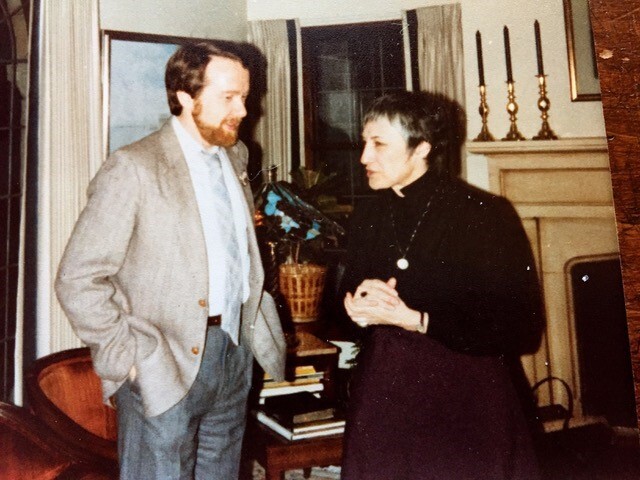John Dillon, who was artistic director of Milwaukee Repertory Theater from 1977 to 1993, spent his last decades in Seattle, and who directed plays all over the U.S. and around the world, particularly in Japan, died on May 13. He was 78.
“Tell him we will be doing A Streetcar Named Desire next season,” John suggested as I prepared to drive a visiting Japanese director to the opening night party for Of Mice and Men. I did, and, sure enough, the invitation arrived in due course to tour that production to Japan.
A flood of such memories rise from my years as managing director of the Milwaukee Repertory Theater, during 16 of which John served as artistic director. They capture for me the special joy of working with him. He thought large and pointed us toward far horizons, geographically and artistically.
I think of John as the person who gave me stories to tell, adventures in far-flung places and at the cutting edge of artistry that I could never have imagined. I will always remember seeing John and Boris Mezdrich waiting for me with red flowers as I arrived in a Moscow, still under Soviet control.
John was not personally flamboyant. He was kind, soft-spoken, and deceptively mild-mannered, for it was not himself that he dramatized. It was his insatiable curiosity about people, places, and creativity that took our company to Japan and Russia and brought the work of artists from Japan, Chile, England, Russia, France, and Mexico to our stages, as well as that of new American playwrights.

John’s artistic vision included expressing a sense of place. He wanted to tell stories about Milwaukee and Wisconsin, and coupled this with his trust and loyalty to the playwrights he nurtured, including Larry Shue, Amlin Gray, and Tom Cole. We toured the state with Cole’s Fighting Bob, telling the story of Wisconsin’s great Progressive leader, and Gray was commissioned to write a piece called Kingdom Come, based on O.E. Rølvaag’s great novel of the struggles of Norwegian immigrants in the upper Midwest.
It was Kingdom Come that brought me an unforgettable memory: We toured the Upper Midwest with this story, whose characters included a young Christian pastor stripped of his authority because he chose to accompany his flock as they left Norway. We performed Kingdom Come at Northland College in Minnesota to the blond-haired Scandinavian grandchildren of those whose story we told. At the conclusion of the play, when the defrocked minister faced the death of one of the community’s strongest figures, and, returning to his true role, said quietly, “Let us pray,” every single person in the audience dropped to their knees. I wept in awe at the back.
John was a person who cared a lot about relationships, and initial projects became extended artistic and personal friendships. He grew close to the company at Japan’s Institute of Dramatic Arts (DARTS), and directed for them a production of Death of a Salesman that won a major award in Tokyo.
This faith in ongoing relationships was also the underpinning of our resident company. Like the playwrights whose work he believed in, John fostered and stretched the actors he worked with. Willing to put into action the artistic equity he believed in, we had one of the first interracial resident companies in the country.
And, somehow, John trusted our audiences. They, in turn, for the most part trusted him. He did not set out to shock his audiences but to bring them along with him on artistic adventures. Along with Shakespeare, we presented the work of Ping Chong, María Irene Fornés, and Daniel Stein. Sometimes the trip got rocky, such as when John commissioned a play about a recent Milwaukee tragedy in which a young Black man had been shot and killed by two white policemen. We were warned not to touch the subject, but John quietly persevered, and An American Journey brought to life the issues in the killing of Daniel Bell, selling out and fostering energetic nightly discussion.
As his managing director, it was wonderful to work with John, because he wasn’t into instant gratification. He gave me time to find the money to underwrite some our most demanding projects and trusted me to try my damnedest.
It is also John I have to thank for the intense pleasure of translating a host of plays from French. It all began at the Odéon in Paris, where the only seats available for L’Atelier (The Workroom) were fold-down seats on the outside aisle, and John kept annoying those around us by whispering, “What did he say?” (John spoke no French.) After the curtain call, he marched us backstage to the dressing room of the author, Jean-Claude Grumberg, who was also performing in the play, and, to Grumberg’s bewilderment, announced that we wanted to do his play in a place the author had never heard of.
I could go on, for the adventures John created for us left me with an endless supply of stories to tell. But John’s life in the theatre stretched far beyond Milwaukee Rep. His creative curiosity touched many others, and his artistic friendships lived as long as he did. Many people shared in the creative life of this mild-mannered man with the soul of an adventurer.
Tonen O’Connor is a Soto Zen Buddhist priest and was the resident priest at the Milwaukee Zen Center from 2001 to 2011.


